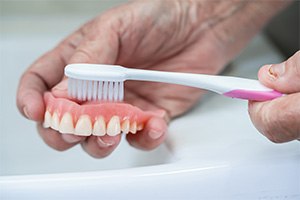Dentures – South Portland, ME
Eat Your Favorite
Foods Again
Tooth loss is a serious problem that affects dozens of millions of Americans. Because this is such a common issue, modern dentistry has advanced to make dentures more lifelike and comfortable than ever before. While the dentures your grandparents wore might have slipped around frequently and resulted in embarrassing speech problems, you shouldn’t have to worry about that with today’s dentures. If you’re ready to restore your smile and biting force and be able to eat your favorite foods again, give us a call today to schedule a consultation for dentures.
What Are Dentures?

Dentures consist of ceramic teeth attached to a gum-colored acrylic base. There are two basic types of dentures: full and partial. Full dentures, also known as traditional dentures, replace an entire arch of missing teeth. They are most likely what you think of when someone says the word “dentures.” Full dentures stay in place with natural suction against the gums, and sometimes denture adhesive if necessary.
Partial dentures, on the other hand, only replace a few missing teeth. They attach to your remaining teeth with metal clasps and fit snugly into your smile like the missing piece of a puzzle, requiring no denture adhesive to stay in place.
Who Should Consider Dentures?

For patients who are missing all of their teeth on either their top of bottom arch, we recommend replacing them with a full denture. Likewise, partial dentures are ideal for patients with some healthy natural teeth remaining. However, before we can place dentures of any kind, we must ensure that your gums are healthy. This means that if you have gum disease, it must be addressed prior to getting fitted for dentures.
The Benefits of Dentures

Dentures offer a variety of benefits that make them a top choice among patients in Portland. From the ability to eat a greater variety of foods to boosted confidence, dentures can rejuvenate your smile, allowing you to enjoy a complete and healthy set of pearly whites once again. Learn more about the variety of benefits dentures have to offer by clicking below or scheduling a consultation!
Psychological & Emotional Benefits

People affected by tooth loss are statistically more likely to experience sadness, depression, anxiety, and other mental and emotional tolls related to the gaps in their smiles. Over time, this can manifest in other areas of your life by making you think twice about going out with friends, capturing memories in photos, and other cornerstones of living your life, all due to having several gaps in your smile. With a complete set of teeth, you may find that your emotional and mental wellness drastically improves.
Clearer Speech

Your teeth play a vital role in your ability to speak clearly and with ease. When several or all of them are missing, you’ll likely find that you develop a lisp, slur your words, or form other speech impediments. While it can take up to 30 days to adjust to the feeling of your dentures in your mouth, you’ll find that after this time period, you’re able to speak clearer and more effortlessly.
Enhanced Nutrition

Being able to eat a wider range of foods won’t just allow you to satisfy your cravings more often, but it will also improve your nutrition. Key vitamins and minerals will be more accessible when you’re able to eat fresh fruits and vegetables, chewier proteins, and more.
Preservation of Oral Health

Tooth loss has been connected to an increased risk of experiencing further tooth loss as well as other oral health problems, like decay and gum disease. When you restore your smile with dentures, you can decrease your likelihood of developing common dental issues associated with tooth loss and maintain an even healthier smile.
Boosted Confidence

A full set of pearly whites allows you to smile with greater pride and confidence. In turn, you may find that you’re more likely to go to social gatherings, accept that job interview you’ve been vying for, or even go on a first date! Being able to walk into these settings feeling good about yourself will help you make a lasting, positive impression.
Tips for Daily Denture Maintenance

After you first receive your dentures, you can expect to deal with some minor soreness for a few days or even weeks. Don’t worry; this should subside as your mouth gets used to your new teeth. It may take some time to grow accustomed to eating. To make it easier, start by cutting your food into bite-size chunks and avoiding sticky foods. Chew evenly on both sides of your mouth to avoid your dentures coming loose or out of place. You can gradually eat larger chunks of food as you get used to chewing with your dentures.
It’s almost always a good idea to avoid sleeping with your dentures in. Taking them out at night gives your gums and jawbone a chance to rest from the pressure of holding your teeth in place all day. Let them soak in denture cleanser and lukewarm (NOT hot) water while you sleep. When you wake up, gently brush your dentures, gums, tongue, and palate with a soft-bristled toothbrush (but no toothpaste, as that could be abrasive to the dentures). This will prevent plaque buildup that could cause gum infections.
Lastly, be sure to see us for a checkup every six months, even if you have no teeth left. Your gums are just as much a part of your oral health as your teeth, and it’s imperative that they’re in good condition. We can also evaluate the state of your dentures to determine when they need to be re-fitted or replaced.
Understanding the Cost of Dentures

Are you searching for a reliable way to restore your smile? Dentures are one of the most popular and affordable ways to replace missing teeth. As with any type of dental work, the cost of dentures in South Portland can vary greatly from patient to patient. During your initial consultation with Dr. Gagnon will carefully examine your mouth, discuss your smile goals, and provide an accurate cost estimate. If you want to know a bit more about the different factors that influence the cost of dentures before visiting our office, keep reading below.
Factors that Affect the Cost of Dentures

There are three major factors that will influence the cost of your dentures:
- If you need preliminary treatments, such as tooth removal or gum disease therapy, to prepare your mouth for dentures
- The type of acrylic used to make the base (the part that is dyed to match your gum tissue)
- The custom replacement teeth, which are typically made from acrylic or porcelain
Shopping around for the cheapest dentures can be tempting, but it is unlikely to pay off in the long term. High-quality dentures from an experienced denture dentist in South Portland are more likely to last longer and fit comfortably than cheaper alternatives. When it comes to restoring your smile, quality counts!
Are Implant Dentures More Expensive?

Implant dentures usually cost more upfront than traditional dentures, but for good reason. Unlike conventional restorations, dental implants replace missing teeth from the roots up. By fusing directly with the jawbone, implant dentures offer maximum stability and restored chewing power. They never shift when eating or speaking, and they look just like natural teeth! In addition, dental implants can last for decades with proper care. Traditional dentures, on the other hand, typically must be replaced every 5 to 7 years. Thanks to the long-lasting nature of dental implants, you could actually save money in the long run by investing in implant dentures.
Does Dental Insurance Cover Dentures?

Yes, most dental insurance plans cover around 50% of the cost of dentures. However, no two insurance plans are exactly alike. Be sure to confirm your coverage with your insurance provider before making any final decisions about how to replace your missing teeth. Need help? Our knowledgeable team will be happy to assist you in understanding the details of your insurance coverage. We always strive to help patients maximize their insurance benefits. We will even file claims on your behalf so you can avoid the hassle!
Other Options for Making Dentures Affordable
At Gannett Drive Dental, we are committed to working with patients to achieve their smile goals in an affordable way. While dental insurance can help reduce your out-of-pocket costs, there are other ways to replace missing teeth without busting your wallet. If you do not have dental insurance, we will gladly work with you to help determine your best available payment options. To learn more about dentures in South Portland, including how to fit them into your budget, schedule a consultation at our office with Dr. Gagnon today.
Dentures Aftercare

Congratulations on your new dentures! Now that you have transformed the appearance and function of your smile, you can begin to enjoy using them! However, even if you have no remaining natural teeth, you’ll still need to see your dentist regularly to continue to monitor the condition of your gums, jaw, and of course, your dentures. At this time, we will also provide important oral cancer screenings, as it can be very difficult to notice certain changes in your oral health on your own when you wear prosthetics.
Removeable Dentures

Remove After Eating
After each meal, be sure to remove and rinse off your dentures. By doing this, you are helping to prevent buildup from food debris and plaque from accumulating on them.
When cleaning, never use hot water, as this can warp the denture material and change their fit.
Clean Your Restoration
Always remove your dentures to clean them at least twice a day. To do this, use a soft-bristled toothbrush and a small amount of unscented hand soap, mild dish soap, or denture cleanser and gently scrub them on all sides.
Never use regular toothpaste to clean your dentures, as these prosthetics are not made to stand up to abrasive products. If you will not be wearing them again for a while after cleaning, be sure to soak them in water or denture soak so they don’t dry out and crack or lose their shape.
Be sure to rinse them well before you put them back into your mouth, as these cleansers are not meant to be in your mouth.
Keep Your Dentures Safe
Be sure to protect your dentures when they are not in your mouth by placing a towel underneath them while you clean them. That way, should you accidentally drop them it will cushion their fall and reduce the probability of them becoming damaged.
Be sure to always keep them out of reach of small children and pets.
Remove When You Sleep
It is important to remove your dentures each night when you go to bed. Wearing them restricts the circulation in your gums, which can cause soft-tissue irritation. Sleeping with dentures has also been associated with an increased risk of pneumonia and gum and tongue plaque. It can also accelerate jawbone deterioration that could eventually require a bone graft procedure to correct.
While they are out of your mouth, be sure to keep them soaking in water or denture soak, as allowing them to dry out can cause them to permanently change their shape.
Notice Changes
It is important to be aware of any changes in your oral health while wearing dentures, including mouth sores, gum irritation, or signs of infection. If you notice any of these developing, contact Gannett Drive Dental as soon as possible.
Should your dentures become damaged, do not attempt to repair them yourself; you could accidentally make the damage worse, which could lead to costlier repairs or require complete replacement. Instead, call your dentist and schedule an emergency appointment and we’ll be happy to help.
If you notice that your dentures are shifting, clicking, or exhibiting any other signs of improper fit, notify your dentist at once. This could indicate that they need to be relined or replaced.
Denture FAQ
Should I Have All My Teeth Pulled to Get Dentures?
While it’s always better to have your natural teeth repaired, rather than extracted and replaced, sometimes removing teeth is the better option. We only recommend extracting teeth if it’s absolutely necessary and once our team has explored all other options. If most or all of your teeth are damaged to the point where they can’t be restored, extracting them and using a full denture may be the more cost-effective solution. There’s no limit on how many teeth we can extract in a single appointment, but certain teeth can be more tricky to remove than others.
Can I Sleep with My Dentures?
We do not recommend sleeping with your dentures, with the exception of the first time you receive them. In this instance, we recommend wearing them for 24 hours. However, after that initial period, you should take them out at night. By wearing your dentures for too long, you restrict blood circulation to your gums. This can lead to soft tissue irritation and cause your ridge to resorb faster. Taking them out periodically gives your gums time to recover and get the nutrients they need every day. You may also experience higher levels of gum and tongue plaque if you wear your denture for too long.
Will Dentures Change the Shape of My Face?
The more teeth you lose, the more your facial muscles begin to sag. This can cause your face to maintain a sunken appearance. By wearing a denture, you can provide support for your facial muscles, improving your overall look. If your dentures do not fit properly, your facial muscles aren’t getting the support they need. For this reason, you should get your denture refitted or replaced if you notice they don’t fit as well as they should be.
Can I Have My Dentures Relined if They Don’t Fit Properly?
Over time (and due to wear and tear), dentures need to be relined if their shape changes. Additionally, they could need repair if some of the teeth inside them are lost or broken. As your underlying bone structure and gum line begin to transform, they may also need to be refitted. Keep in mind that relines are not typically covered under dental insurance.
There are two types of relines to consider. First, there’s soft relines, which are performed if your gums are sensitive to the weight of the denture. To perform a soft reline, we add more cushion to the denture to reduce gum irritation.
The second type is a hard reline, which is done for more extensive issues. These require you to send your denture to an offsite lab. However, they can last for years afterwards.
